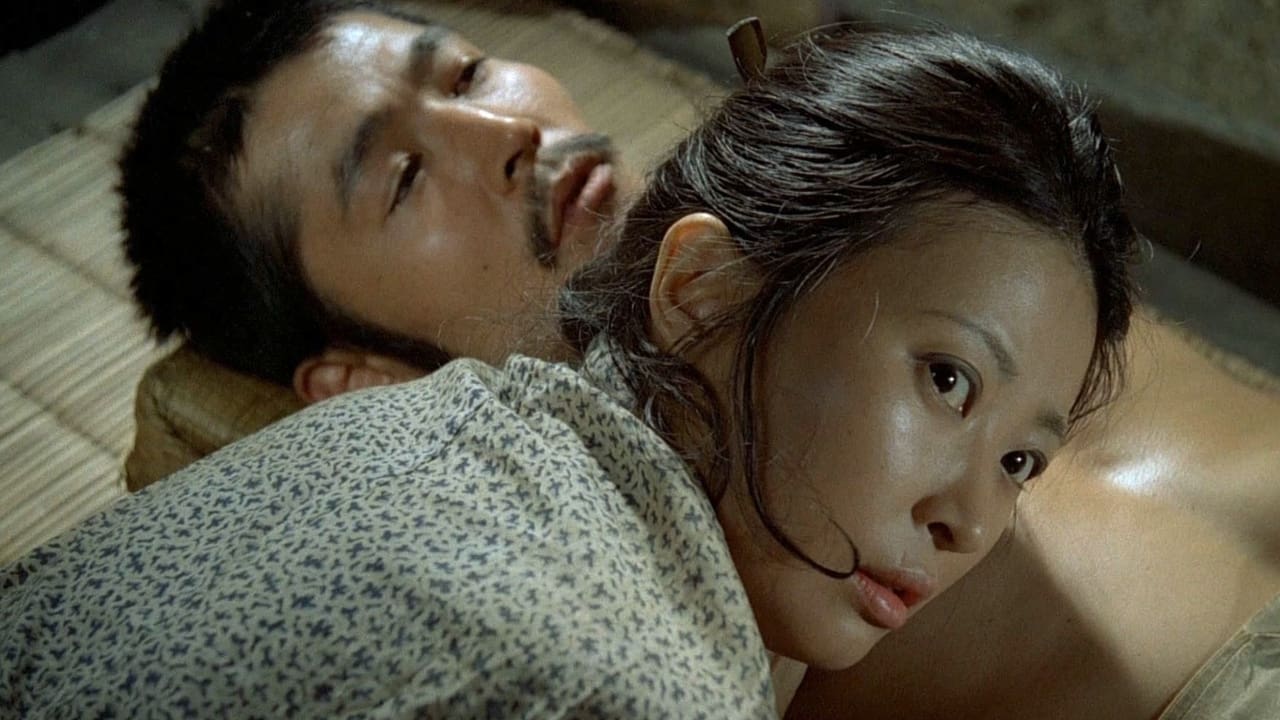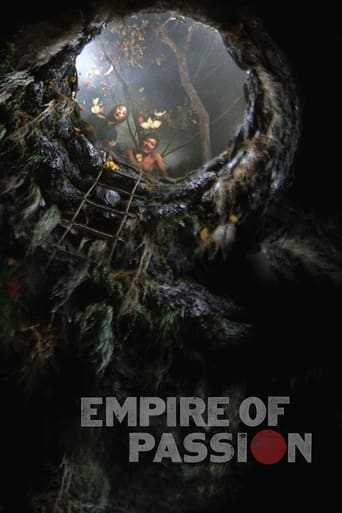

I am a great fan of Ôshima's work, though unfortunately I have only seen previously six films of his, all between 1965's 'Pleasures of the Flesh' and 1976's extremely controversial 'In the Realm of the Senses'. This, like the latter, was a period piece that looked at a doomed relationship (this time in 1895), though far less scandalous in its sexuality, though still titillating nevertheless. Exiled and forced to work with the French in order to continue his passion, Ôshima's storytelling, through Yoshio Miyajima's gorgeous camera-work and another exemplary soundtrack by Japanese scoring genius, Tôru Takemitsu, and remarkably passion-ate performances by its stars, Tatsuya Fuji (who separated his shoulder, his acting was so intense) and Kazuko Yoshiyuki (who, I must admit, has the most amazing nipples I have ever seen), was great, earning him Best Director at Cannes. It seemed a reverse noir, with Fuji's Toyoji playing the seducer, and Yoshiuki's once-faithful wife being persuaded to be co-conspirator to her loving (but not fulfilling her desires) rickshaw-driver husband, not to mention a fine ghost story, with Gisaburo's very patient ghost taking three years to finally bring himself justice, by forcing the community to press the horribly-incompetent (almost as inept as Doug McGrath's Sergeant Nash in the original 'Black Christmas'!) Inspector Hotta to eventually torture confessions out of the ill-fated duo. Another film to see with the person you love!...
... View MoreI'm not sure if I qualify for commenting on this movie. I'm on and off impressed with director Nagisa Ooshima's movies. I'm not from the generation when he was at the zenith of his career, and I can't comment on how much of a shock value his movies had in the '60s and '70s.The movie is beautiful. One thing I can say about director Ooshima is the perfection of beauty of his visuals.The story seems rather prosaic now after 35 years since it was made. It's a simple story about a murder based on an affair. How unusual is that ? I was counting on Ooshima's sharpness at making a point from his unique perspective as a director, and a story teller. I couldn't find that here, and is my point of disappointment.The movie is rather ordinary Japanese movie from the '70s. It's got stunningly beautiful visuals compared to movies other directors made around the same period (see for instance "Inugami no Tatari" that takes place in a similar setting and you'll see how great Nagisa Ooshima's visual presentation is), but the story and the acting is rather average. I also couldn't feel the outstanding "speed" that I usually feel when watching his better movies.So I'm only commenting from the 21st century perspective on this movie, and may not at all be fair to the movie or the director. But it's a good movie that's mildly interesting to watch, with absolutely first class cinematography. You would have to see this yourself, and be the judge of its value.
... View More... and I know nothing about Japan or Japanese cinema. I just accidentally tuned in to this one close to its beginning at 4AM, expecting to be bored. Instead it discreetly pulled me in by its not so discreet plot and acting.The synopsis says that it is about a younger man having an affair with an older woman. However, the woman (Seki) does not look to be that much older than the young man, Toyoji. Seki's husband is a rather dull rickshaw driver, and Toyoji's giving Seki the romantic attention that her husband Gisaburo does not. However Gisaburo loves Seki, just in his own understated way. Where things get a little strange is in Toyoji's point of view. First he insists on "shaving" Seki, then he insists that because he has done this Gisaburo will know about the affair and they must therefore murder Gisaburo. Seki, just as passive as her husband, agrees and together they strangle Gisaburo and throw him down an old well. Here's where things get even stranger, from a human nature standpoint - everyone in the community just accepts the fact that Gisaburo left town and does not come back - for three years. The only thing that arouses their suspicion is, after a three year absence, his ghost starts appearing to the townspeople asking for this and that - saying that he wants his pipe, new clothes etc. since he hasn't had any for so long. Odd that dreams arouse their suspicion when the hard evidence of a man you could set your watch by disappearing in thin air does not.Then Seki starts seeing Ginsburo's ghost. Ginsburo's ghost is corporal though - he can and does pull his rickshaw around, drink, and smoke just as he did in life. The one person the ghost does not appear to is Toyoji, so as Seki slowly starts to emotionally unravel, Toyoji just thinks its guilt and panic eating at her and is not very sympathetic towards her.Finally there is the brutality of the police that is quite a shock. The detective investigating Ginsburo's disappearance keeps telling the townspeople that he can't arrest anyone without proof, but when he does the accepted protocol of interrogation is to hang the suspect by a tree in public and cane them until they confess. Why bother with an investigation if torture is the next step after an arrest? You could get a confession out of anybody this way.The whole thing has a very surreal quality, a story with universal themes but some odd behavior I just chalk up either to directorial style or cultural differences or maybe both, and some beautiful shots of the Japanese countryside, which is sometimes easily overlooked in the face of this very strange but engaging tale.
... View MoreWell, I enjoyed "Ai no corrida" (Realm of Senses), and didn't expect much of this one. And I wasn't mistaken - it's boring. I like Oshima for his "Merry Christmas, Mr. Lawrence" and "Realm of Senses", but this film disappointed me. The plot is too forced, characters have no motivation. Pity.
... View More